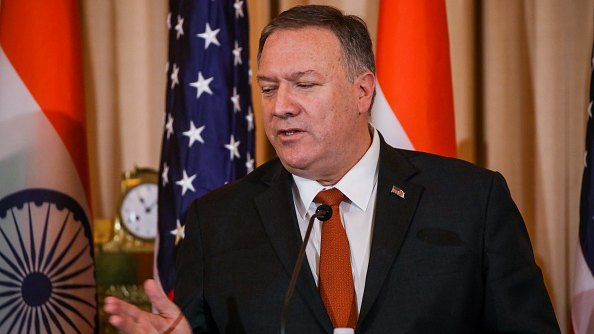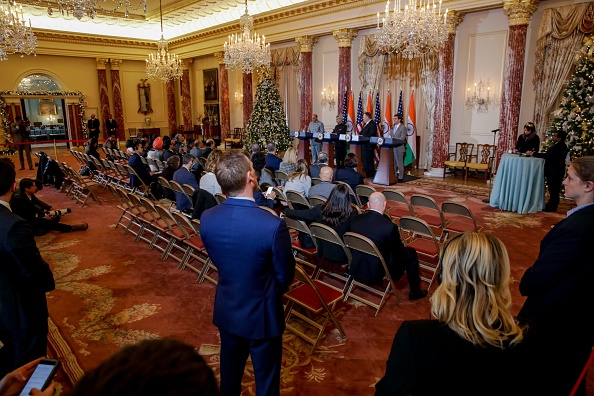
U.S. Secretary of State Mike Pompeo participates in a press conference at the State Department in Washington, D.C., U.S., December 18, 2019. /Getty
U.S. Secretary of State Mike Pompeo participates in a press conference at the State Department in Washington, D.C., U.S., December 18, 2019. /Getty
Editor's Note: Andrew Korybko is a Moscow-based American political analyst. The article reflects the author's views and not necessarily those of CGTN.
U.S. Secretary of State Mike Pompeo is on a four-nation tour of the Indo-Pacific this week that will take him to India, Sri Lanka, the Maldives and Indonesia. It represents the most assertive thrust yet of America's attempt to "contain" China in the vast trans-regional space, which is shaping up to be the U.S.' unofficial policy in this part of the world. While he'll leave India with important progress being made on this front, he's unlikely to have much to show for his visits to the other three nations. For that reason, it's predicted that this trip won't succeed with its unstated but heavily implied strategic goal.
Pompeo's first destination is India, where he'll participate in a 2+2 meeting between the two countries' foreign and defense ministers. The two sides intend to sign the long-negotiated "Basic Exchange and Cooperation Agreement" (BECA), which will be the third "foundational pact" between their armed forces.
BECA will allow India to use the U.S.' geospatial capabilities while the prior Logistics Exchange Memorandum of Agreement (LEMOA) and Communications Capability and Security Agreement (COMCASA) facilitate military logistical and communications cooperation. All three improve the interoperability between their armed forces.
When he goes to Sri Lanka, it's expected that Pompeo will discuss the $480 million Millennium Challenge Corporation grant that the U.S. plans to offer the island nation. There will probably also be talks about a new Status of Forces Agreement (SOFA) too. Both topics are very controversial in Sri Lankan society because of concerns that they'll make it more difficult for the country to retain its neutral foreign policy.
As for his itinerary in the Maldives, Pompeo will probably celebrate the defense pact that the two countries clinched in September. He will also try to use economic means to lure the country closer to the U.S., just like he'll try to do in Sri Lanka.

U.S. Secretary of State Mike Pompeo (2nd L), U.S. Secretary of Defense, Mark Esper (R), Indian Defense Minister Rajnath Singh (L) and Indian Foreign Minister Subrahmanyam Jaishankar (2nd L) hold a joint press conference at the State Department in Washington, DC, United States, December 18, 2019. /Getty
U.S. Secretary of State Mike Pompeo (2nd L), U.S. Secretary of Defense, Mark Esper (R), Indian Defense Minister Rajnath Singh (L) and Indian Foreign Minister Subrahmanyam Jaishankar (2nd L) hold a joint press conference at the State Department in Washington, DC, United States, December 18, 2019. /Getty
The Indonesian leg of his journey will be the most interesting to observe after reports recently circulated that the country rejected the U.S.' request over the summer to host spy planes that planned to surveil Chinese positions in the South China Sea. Pompeo's task will therefore be to patch up relations with the traditionally neutral nation, which is one of the founders of the Non-Aligned Movement, after America's failed attempt to turn it against China harmed the trust that used to characterize their ties. He'll likely still try to court it to the U.S.' side, but probably not as aggressively as before, and no significant progress is expected anytime soon.
Taken together, there are three trends that connect all four visits, the most obvious of which is the military component. The U.S.' related outreaches to India and the Maldives have succeeded, whereas they stalled in Sri Lanka and failed in Indonesia. The other trend is the U.S.' efforts to boost India's standing as a regional "counterweight" to China, which implies supporting its hegemonic aspirations in the Indian Ocean. This could backfire if they push too hard on nearby Sri Lanka and the Maldives, who might then seek to further improve their economic relations with China as a counterbalance. Lastly, the U.S. wants Indonesia to join the Quad.
From this strategic insight, an intriguing observation can be made about the diametrically different directions that India and Indonesia are moving in. While India is enthusiastically going along with the U.S.' destabilizing plans with the mistaken expectation that it will improve its regional standing, Indonesia is respectfully declining to do so, preferring instead to remain on equally good terms with the U.S. and China.
Considering their geostrategic locations and enormous sizes, it can thus be said that their respective choices will leave a lasting impact on Indo-Pacific geopolitics, one which will influence whether other countries follow in their footsteps.
As it stands, the Indonesian model is objectively the most attractive for all others. It truly embodies the win-win principle of mutually beneficial cooperation without causing concerns for any third country, unlike India's growing closeness with the U.S. in ways that strongly imply its hostile intention to "contain" China.
All things considered, it can be said that Pompeo's anti-China "containment" mission will fail. Although he'll score some tangible success on the Indian front, that was to be expected, but it'll be his failure to court Indonesia into the Quad that will define this trip's legacy. Without Indonesia on the U.S.' side, it's impossible to "contain" China.
(If you want to contribute and have specific expertise, please contact us at opinions@cgtn.com.)